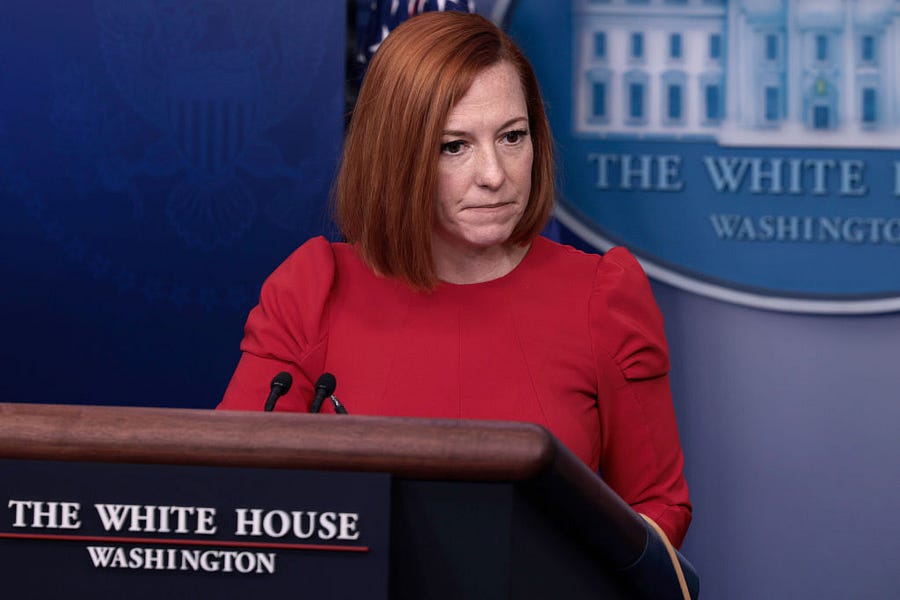At a White House briefing on Monday, press secretary Jen Psaki was asked: “Before Joe Biden was president, he said that COVID travel restrictions on foreign countries were ‘hysterical xenophobia’ and ‘fear mongering.’ So what changed?”
The question came after the Biden administration banned travel from South Africa, where the latest variant of COVID-19 was recently detected, along with seven other African countries.
Psaki responded by saying that “what the president was critical of was the way that the former president put out, I believe, a xenophobic tweet; and how he called — what he called the coronavirus; and who he directed it at.”
Psaki was referring to a tweet from March 18, 2020, in which Trump said: “I always treated the Chinese Virus very seriously, and have done a very good job from the beginning, including my very early decision to close the ‘borders’ from China — against the wishes of almost all. Many lives were saved. The Fake News new narrative is disgraceful & false!”
But the comments brought up in the question posed to Psaki came earlier, at a January 31, 2020, campaign rally in Iowa, where Biden told the crowd: “The American people need to have a president who they can trust what he says about it. That he is going to act rationally about it. In moments like this, this is where the credibility of a president is most needed, as he explains what we should and should not do. This is no time for Donald Trump’s record of hysterical xenophobia and fear mongering to lead the way instead of science.”
Biden’s comments came the same afternoon that restrictions on travel from China were announced by the Trump administration, and were perceived by some as a dig at the travel restrictions, though Biden did not mention them explicitly. After weeks of Trump allies accusing Biden of calling the travel restrictions xenophobic, on April 3, 2020, Biden’s campaign released a statement saying he was in favor of the travel restrictions as they were supported by scientific evidence.
This particular subject is a bit complicated: Biden never said directly that the travel restrictions were xenophobic but he continued to refer to Trump’s xenophobia within the context of the coronavirus pandemic in the days following the announced travel restrictions. When Trump restricted travel from Europe, Biden tweeted: “A wall will not stop the coronavirus. Banning all travel from Europe — or any other part of the world — will not stop it. This disease could impact every nation and any person on the planet — and we need a plan to combat it.”
What is clear, however, is that when Biden made his initial comments, Trump had yet to publicly start referring to the pandemic in terms critics considered xenophobic. He referred to COVID-19 as “the Chinese virus” for the first time on March 16, 2020. Further instances, such as Trump calling it the “the kung flu,” followed. In fact, in the early stages of the pandemic, Trump praised the Chinese response to the spreading coronavirus, taking the Chinese regime at its word even as it was becoming apparent that Chinese officials were not being transparent about the virus.
On January 29, Trump said, “I think our relationship with China now might be the best it’s been in a long, long time.” On January 30 Trump said, as he had several times before, that he was “working closely with China and others on coronavirus outbreak.” On February 2, Trump told Sean Hannity that “We have a tremendous relationship with China, which is a positive thing.” On February 7, Trump tweeted: “Great discipline is taking place in China, as President Xi strongly leads what will be a very successful operation. We are working closely with China to help!”
Biden spokespeople have denied that the president was referring to the Trump travel restrictions when he made his remarks about “hysterical xenophobia” and “fear mongering.” Whatever his intent, Psaki is incorrect to claim that the comments were prompted by how Trump was then referring to the virus.
The White House declined to comment on the record.
If you have a claim you would like to see us fact check, please send us an email at factcheck@thedispatch.com. If you would like to suggest a correction to this piece or any other Dispatch article, please email corrections@thedispatch.com.







Please note that we at The Dispatch hold ourselves, our work, and our commenters to a higher standard than other places on the internet. We welcome comments that foster genuine debate or discussion—including comments critical of us or our work—but responses that include ad hominem attacks on fellow Dispatch members or are intended to stoke fear and anger may be moderated.
With your membership, you only have the ability to comment on The Morning Dispatch articles. Consider upgrading to join the conversation everywhere.